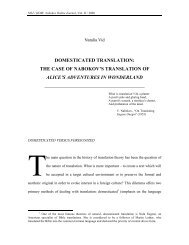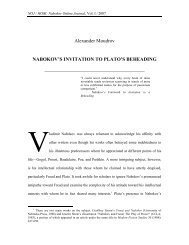You also want an ePaper? Increase the reach of your titles
YUMPU automatically turns print PDFs into web optimized ePapers that Google loves.
Nabokov Online Journal, Vol. V (2011)<br />
_______________________________________________________________________<br />
PIA PERA’S LO AND FOUL PLAY<br />
In a statement issued through her publisher, Pia Pera suggests that her literary<br />
experiment in Lo’s Diary has been legitimized by Nabokov’s text itself, by its<br />
intertextuality, its parodic playfulness and encouragement to join its literary games: “All I<br />
did was to accept Nabokov’s challenge, his implied invitation to a literary tennis match<br />
that, it seems to me, has a long and well established tradition behind it.” Pera reads<br />
Humbert’s tongue-in-cheek bemoaning of his own maleness – “Oh, that I were a lady<br />
writer who could have [Lolita] pose naked in a naked light” – as just such an invitation<br />
(quoted in Blumenthal). Pera’s response to this provocation, then, is to follow with<br />
meticulous precision every detail of the original text, attempting to reconstruct it through<br />
the vision of the teen-age girl.<br />
In creating a parody of Nabokov’s Lolita, Pera attacks precisely the book’s belief<br />
in the ethical value of aesthetics. In its anti-aesthetic stance, Pera’s text is rabidly<br />
postmodern; her parody attempts to undermine what might be called the modernist cliché<br />
of elitist aestheticism. The fact that Pera’s novel is formally unassuming (it was critically<br />
panned for its lackluster writing) merely underscores the distrust in aesthetics that<br />
informs its content.<br />
According to Morson, parody woos an audience to its side in its battle with its<br />
target by recontextualizing the original: “Parody aims to discredit an act of speech by<br />
redirecting attention from its text to a compromising context” (113). The attention<br />
redirected in this case being that of the reader, Morson’s theory of parody radically<br />
diverges from that of the Russian Formalists, who argue that, in contrast to satire, which<br />
attacks extraliterary vices, parody assaults textual matters, specifically style or artistic<br />
method. For Tynyanov, parody’s strictly literary aim is the rejuvenation of outdated<br />
forms, and it, rather than political or social change, drives the process of literary<br />
evolution.<br />
that “satire is a lesson, parody is a game” (Strong Opinions 75), there is a lesson in Nabokov’s ludic web –<br />
namely, how to be a less complacent, more attentive reader.<br />
12

















